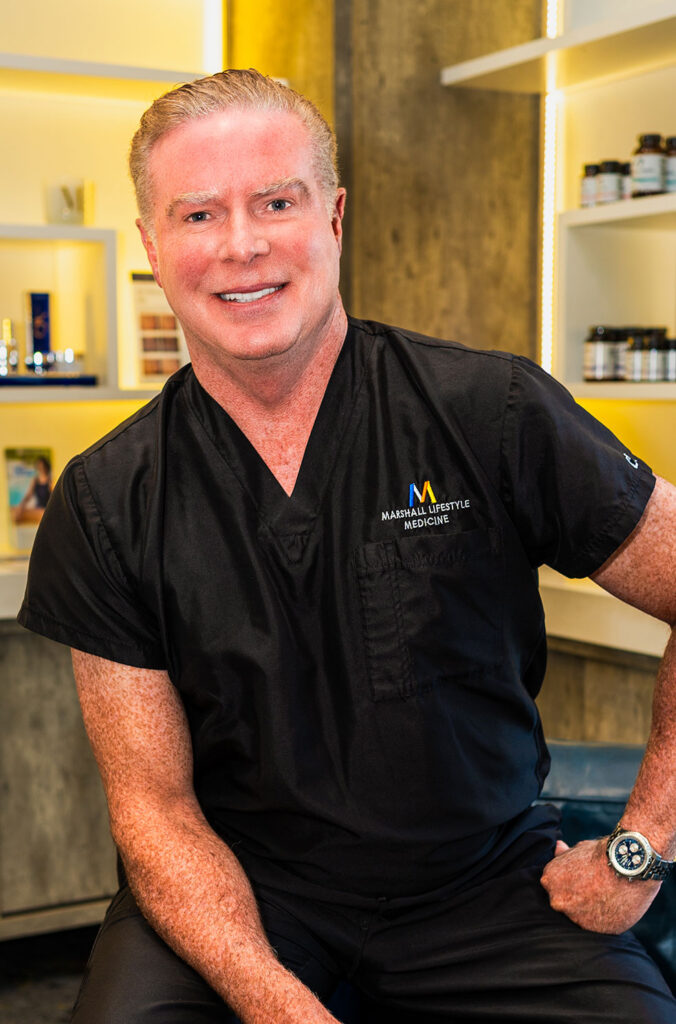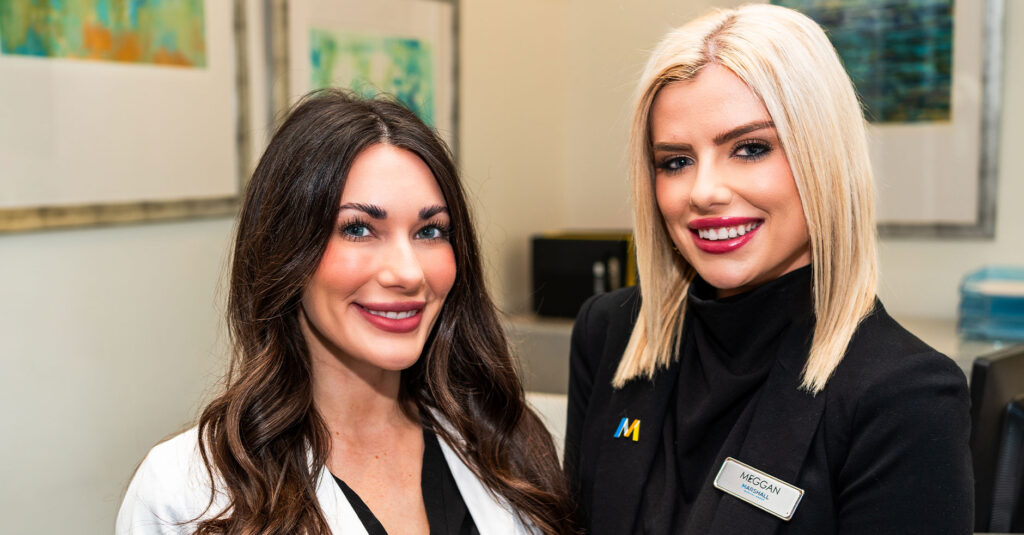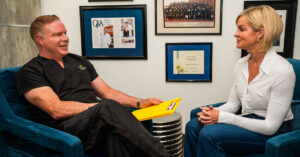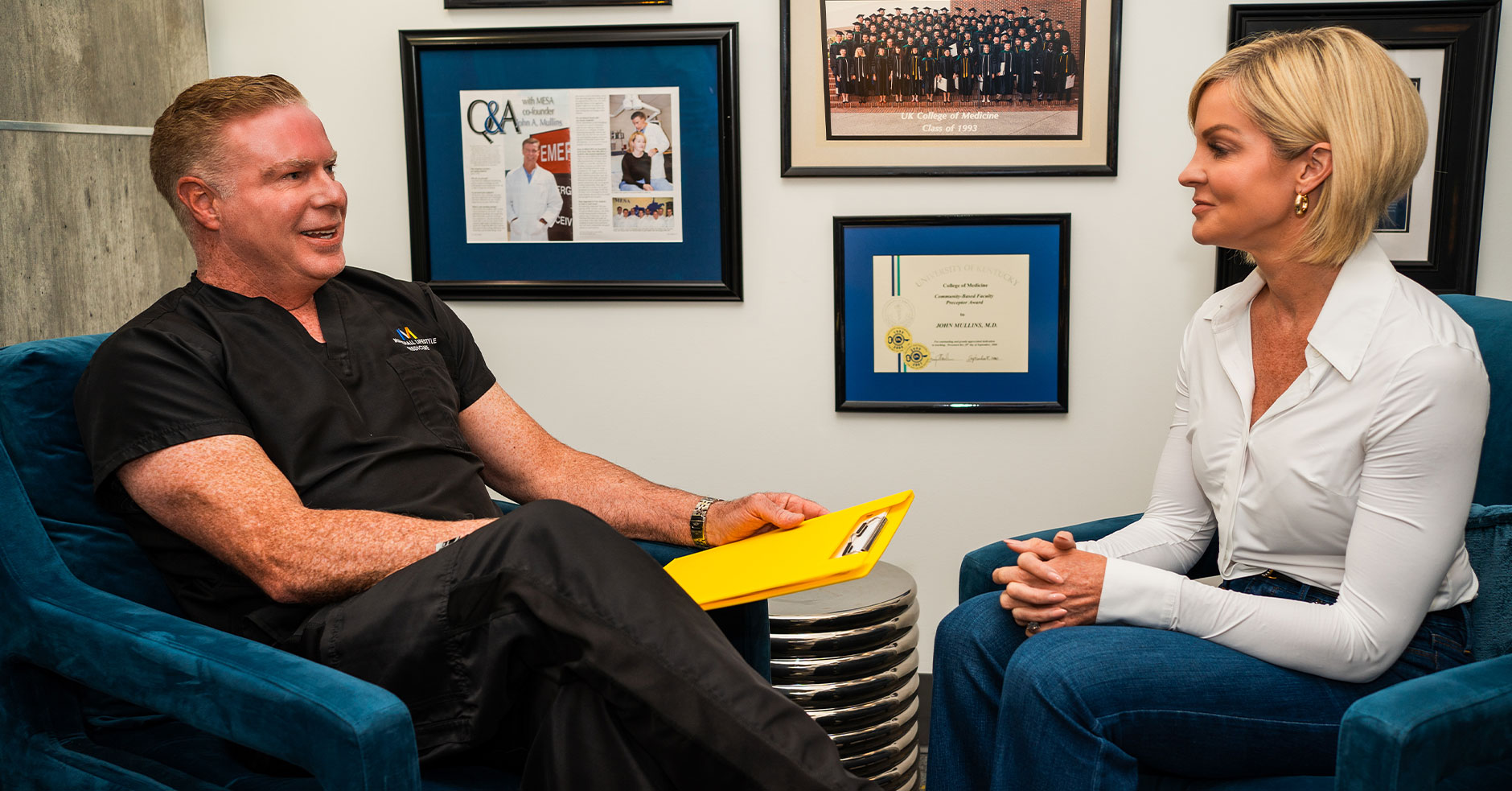John Mullins, MD, and Marshall Lifestyle Medicine see a new healthcare paradigm
LEXINGTON “Lifestyle” only partially describes Marshall Lifestyle Medicine, founded by John Marshall Mullins, MD, in the fall of 2015. Mullins says that the term came into his head as he was searching for a way to describe the type of medical practice that he envisioned, one that would incorporate various and vital aspects of health, wellness, prevention, regeneration, fitness, spirituality, sexuality, and longevity. Mullins says that even before he knew that there was an emerging subspecialty called “lifestyle medicine,” he was creating the medical practice that pursues “living long and living well.”
The American Academy of Lifestyle Medicine describes six pillars of lifestyle medicine. They are nutrition, physical activity, stress management, restorative sleep, social connection, and avoiding risky substances.
Marshall Lifestyle Medicine’s 40+ page description of its purpose and services expands and expounds on those pillars as fundamental tenets and goals for patients and providers. Those services include hormone infusions, peptides, aesthetic products and services, care for sexual health, and regenerative and preventative medicine.
In the Beginning
To fully understand the creation and evolution of John Mullins, MD, and Marshall Lifestyle Medicine, it’s necessary to journey back to 1994. Mullins was an orthopedic surgery resident, fresh out of UK medical school. To pick up some extra money, he moonlighted as an ER doctor, hired over the phone by a staffing company. Mullins recalls being hired, sight unseen and unknown. “I was nothing more than a warm body to fill a shift. I was unqualified, and there I was.”
During an ER shift, Mullins ran into Jimmy Foster, MD, a classmate from UK,

in what became a “Steve Jobs meets Steve Wozniak” moment. In 1996, Mullins and Foster founded Marshall Emergency Services Associates, or MESA, in the spare bedroom at the apartment of one of their employees. They named it “Marshall” because that was a middle name serendipitously shared by Mullins and Frazier. They shared more than middle names though; they both recognized the need for change in the delivery of emergency medicine.
MESA became a success. Mullins and Frazier worked emergency shifts for days at a time. “We used to joke about how many days we went without sleep,” Mullins recalls. MESA recruited other doctors and was soon contracting with hospitals to staff their ERs. To say that ERs were the red-headed stepchild of a community hospital is an injustice to red-headed stepchildren. Mullins states, “The ERs were a community hospital’s nightmare. Most were understaffed, a drain on money and resources, a demoralizing and debilitating place to work. Patient care was erratic and archaic. MESA took that burden off the hospital administration’s plate. We created a system of metrics where performance and accountability were demonstrable and repeatable in every hospital and community location.”
By 2013 MESA had contracts with 24 hospitals in Kentucky, Ohio, Indiana, and West Virginia. They employed over 400 ER doctors, APRNs, administrative staff, and hospitalists. Treating over 600,000 patients a year, the revenues exceeded $10 million dollars annually.
“It was hard work, but we were committed. Our staffing system worked. Our patient and customer satisfaction survey rates exceeded expectations. Community hospitals loved MESA. We kept growing while Jimmy and I continued to take our fair share of ER shifts, working 100 hours a week, holidays, weekends, overnights, along with everyone else,” says Mullins. “We were killing ourselves,” he says. That changed in October 2013 when MESA was acquired for $115 million by TeamHealth, a physician staffing company with a national footprint. Mullins recalls the day the deal closed.
“I grew up poor. My family lived in South Dakota, and when I was 15, we moved to southern Kentucky. Most of my early life consisted of working to help out with family finances. My father was a truck driver. I mowed grass, shoveled snow, and worked fast food from sixth to twelfth grade. I worked so that I could have the necessities in life. All my life I had a goal to ‘make it’ so that my kids never had to struggle. I chased a dream of wealth and success and now at age 44 I have achieved that dream. But the night the deal with TeamHealth closed, I had never felt so empty,” says Mullins. “Empty and exhausted. I had achieved the success I had dreamed of, and it came at great cost — to my mind, my soul, my body, my relationships, my life.”

Marshall Lifestyle Medicine Starts… Slowly
For about a year and a half, from 2013 to 2015, Mullins pondered and imagined the future of healthcare and his role in it. He knew first-hand the underside of it: physician burnout, pre-authorization paperwork, delayed treatment, and declining reimbursements. He had lived in the belly of the beast. Now he was free to practice medicine the way he wanted to, but what did that look like, and how would that work?
“I was sitting in a primary care office, waiting to get something to help me sleep because years of overnight ER shifts had wrecked my sleep patterns. I had to wait three hours, thinking ‘how can this be a good system? If I had a job, how could I take off three hours for a fifteen-minute doctor’s appointment?’ It was the first time that I engaged the healthcare system as a patient, not as a doctor.”
“That’s when the term ‘lifestyle’ came to me,” says Mullins. “It just kept popping into my head. So, I developed a set of core principles, foundational guidelines that were like what we did with MESA. I wanted healthcare that was accessible, attainable, with demonstrable results, scalable and repeatable for my patients who wanted to not only live long, but also live heathy, active, and fulfilling lives.”
Mullins infused his new medical practice with concepts he borrowed from the hospitality industry. Ambience. Patient comfort. Relaxation. How did the experience feel, as well as what were the results? He read The Happiness Project by Gretchen Rubin. He determined that his goal was not only delivering medical care to his patients, but also help them “feel good about going to their doctor, not because they were sick, but because they were healthy and happy.”
The first location of Marshall Lifestyle Medicine opened in 2016 on a busy commercial road in east Lexington, Kentucky. It looked like a spa with warm, rich colors, comfortable furniture, soft music and lighting, no sliding glass windows separating staff from the patients. The staff was trained in hospitality. The practice business model was a combination of concierge, regenerative and preventative medicine all under a new umbrella he coined “hospitality healthcare.” He also opened a true “medical spa” where he was committed to raising standards in a very standardless field. The goal was to teach his patients lifestyle principles that would allow for a more balanced life. He wanted to help other busy professionals avoid the pitfalls of pursuing arbitrary finish lines while promoting prevention, early detection, and optimization.
Membership plans with various levels of physician engagement were created. Additional services such as nutrition, infusions, a fitness club, aesthetic procedures, sexual vitality, and more were designed by Mullins for those high-functioning individuals, male or female, who have achieved much success in their life, but were somehow losing their edge. “Something just didn’t feel right to these people. They were not living up to their own expectations and they were looking for
Marshall Lifestyle Medicine attracts high-functioning adults, evenly split between genders, with 38-44 being the largest age group.
an answer,” he says.
The first month that Marshall Lifestyle Medicine was open for patients, Mullins recalls that the response was a big fat zero, as in no patients! “I had spent over a million dollars building this medical office and training staff and we had no patients the first month. In the second month we had one patient, and two patients after three months,” Mullins says. “Eventually, patients found us, and confirmed our belief that there was a need and desire for our kind of medical practice. Patients just didn’t know it existed yet… until it did.”
Eight Years Later and Growing
From that inauspicious opening, Marshall Lifestyle Medicine now has three Central Kentucky locations, two in Lexington and one in Georgetown. Mullins says that the concierge, direct pay, patient to doctor, no-insurance model is working well now, and he has nearly capped out at 400 patients at each location, which is the number where the practice is profitable, but the patient experience is maintained. Mullins sees patients three days a week, Wednesday through Friday, approximately 8–12 patients a day. Most of the patients come to the practice once a week for a consultation, a treatment, an infusion, or an aesthetic procedure. All his patients have his cell phone number and can reach him for urgent care needs, advice, ER avoidance, or simply to talk. When needed, patients are referred to specialists. Advanced diagnostic screenings are routinely part of the prevention care model.
Always a student of metrics, Mullins confidently states that the average age of his patient is 48 years old, with 38- to 44-yearolds being the largest cell. The genders are split equally 50-50 and 90% are couples. “No matter which spouse comes in first, the other spouse soon follows,” he says. “It’s inevitable that when one spouse sees the results of our approach to health and lifestyle, they want to be part of it as well.”
In August 2024, Marshall Lifestyle Medicine will open its first location in Louisville. It is a continuation of Mullins’ plan to open multiple locations throughout the Kentuckiana and Ohio regions, duplicating the roadmap and success of MESA. Mullins is actively recruiting doctors to join the Marshall Lifestyle Medicine team. “My first option are ER doctors because I know them. I know how they think, how they can multi-task and are results driven. I’m also interested in residents who want to have the work-life balance and patient interaction that we offer. We develop personal relationships with our patients, which are difficult to build when you see 40 to 50 patients a day, as is the case in most primary care offices,” says Mullins.
“I believe that Marshall Lifestyle Medicine is the first in its category, so we are truly unique,” he says. “We have a high access-to-physician model. We use a hospitality approach to make our patients feel comfortable, using their words to engage with them. We meet people where there are in the moment when they walk into our practice. We don’t try to change them overnight, but we give them a structure and path to better health, vitality, and prosperity.”
Mullins stresses that Marshall Lifestyle Medicine diverges from both direct-pay traditional medicine and esoteric lifestyle medicine approaches, which he says the public is not yet ready for. “We offer improved provider access for a fee, and our focus is on preventing what’s preventable and detecting what needs to be detected early, and optimizing everything else,” says Mullins. “We have testing for the one-offs because there’s always the outlier. Our goal is optimizing health-span — a life free of disease and disability.”
The Doctor’s Doctor
Mullins recalls his three-hour wait in the waiting room, saying “When doctors treat other doctors as patients, they treat them with deference. When I was sitting in that waiting room, they didn’t know I was a doctor, so I was treated like a normal patient. It blew my mind. That’s when I knew I had to reinvent how healthcare was being delivered.”
Physician burnout is rampant with physician suicide ever-increasing. Mullins believes that the Marshall Lifestyle Medicine approach to a doctor’s own physical and mental health can help turn the tide. “We attract high-functioning individuals and executives, like doctors, who have made a million small decisions in their lives to get where they are now. Now we give them the choices, the structure, the engagement, and the accountability to live the healthy and fulfilling life they want to live for the rest of their lives.”
“Everything I do is to raise standards, to be above reproach. That’s my litmus test for every decision concerning Marshall Lifestyle Medicine, ‘Are we raising standards? Is it defendable? Is it good healthcare?’”
Mullins says the Lexington experience has told him that his vision is what people want in healthcare. Now he’s ready to take it on the road.


